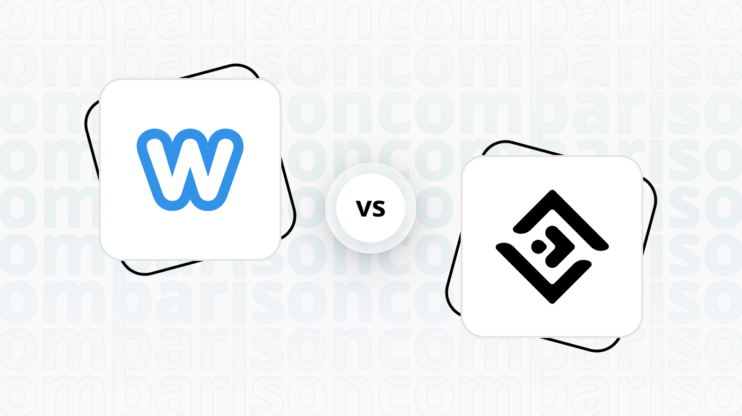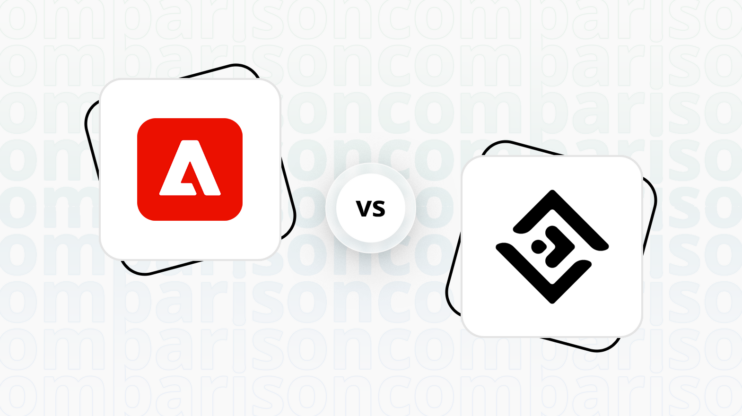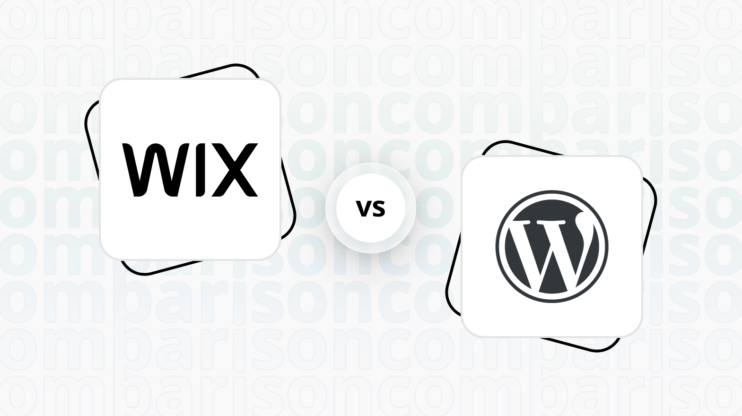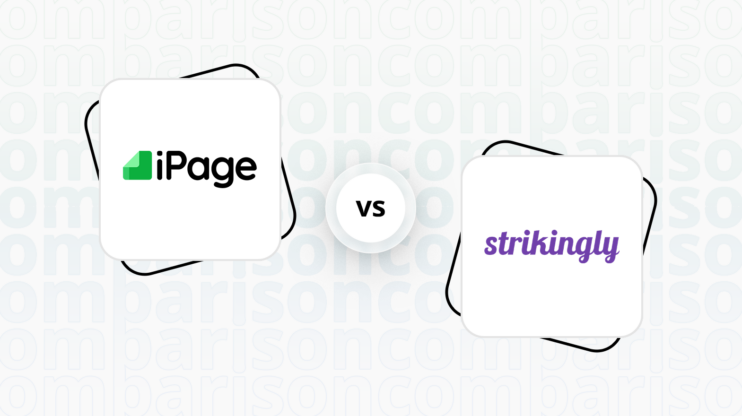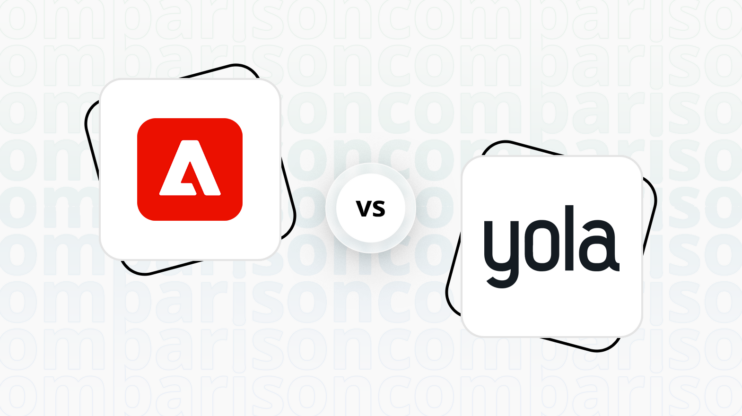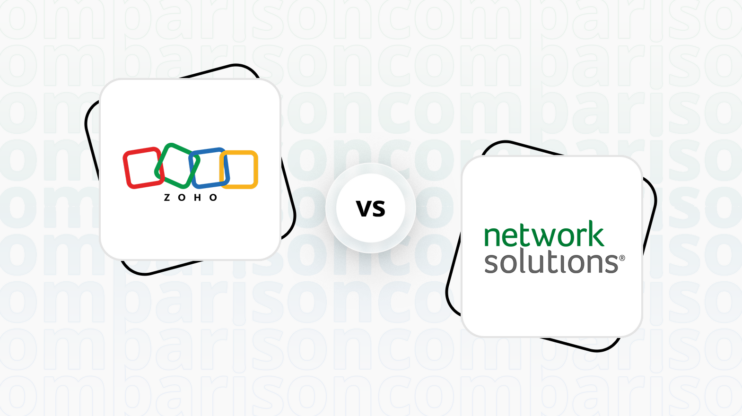Final verdict
Weebly and Adobe Commerce (ex Magento) cater to different segments of the market, each with its unique strengths.
-
Weebly (Overall Grade: 7.3/10)
is praised for its user-friendly interface, making it an excellent choice for beginners and small businesses. It offers a range of templates, ecommerce features, and a robust blogging platform, all designed to be accessible without requiring extensive technical knowledge. Weebly’s affordability and ease of use make it ideal for those looking to quickly set up a professional-looking website without a significant investment. -
Adobe Commerce (ex Magento) (Overall Grade: 6.9/10),
on the other hand, is a powerhouse for larger businesses and enterprises that require a high level of customization and scalability. Its extensive features support B2B and B2C operations, multiple brands, and global markets, making it suitable for businesses looking to expand their online presence. While it has a steeper learning curve and higher cost, its robust capabilities are well-suited for complex ecommerce needs.

|

|
|
|---|---|---|
|
Design functionalities & templates |
7.4 |
6.7 |
|
Ease of use |
8.1 |
5.4 |
|
Ecommerce |
7.1 |
9.4 |
|
Website Editors |
7.6 |
7.8 |
|
Product testing options |
8.3 |
3.9 |
|
Price |
8.4 |
5.8 |
|
Hosting quality |
7.7 |
8.1 |
|
Website speed optimization |
7.9 |
6.6 |
|
Plugins/extensions and integrations |
7.5 |
9.1 |
|
Marketing features |
7.1 |
8.1 |
|
Customer support |
7.3 |
8.3 |
|
Website security |
8.3 |
8.4 |
|
AI capabilities |
1.8 |
7.7 |
|
User management |
6.5 |
8.0 |
| Overall |
7.3 |
6.9 |
Best for ecommerce
 7.1
7.1
 9.4
9.4
Verdict
: Adobe Commerce (ex Magento) is the superior choice for ecommerce, offering a robust platform for businesses aiming for growth and customization. Weebly serves well for smaller stores or those just starting out.
-
Weebly
: Offers a straightforward, user-friendly platform with essential ecommerce features suitable for small businesses or startups. It provides a solid foundation for online selling but may not scale as effectively for larger operations. -
Adobe Commerce (ex Magento)
: Stands out with its comprehensive ecommerce capabilities, catering to both B2B and B2C markets. It’s designed for scalability, offering extensive customization, advanced marketing tools, and a wide range of integrations for a tailored ecommerce experience.
Best for informational & business websites
 7.9
7.9
 7.4
7.4
Verdict
: Weebly edges out Adobe Commerce (ex Magento) for informational and business websites, thanks to its user-friendly design and ease of use, making it more accessible for businesses focusing on content rather than complex ecommerce functionality.
-
Weebly
: With a score of 7.9, Weebly shines for informational and business websites due to its straightforward drag-and-drop interface, a variety of themes, and mobile-friendly design. It’s particularly well-suited for users looking for an easy-to-manage platform without the need for extensive technical knowledge. -
Adobe Commerce (ex Magento)
: Scoring 7.4, Adobe Commerce is a robust platform offering extensive customization and scalability. However, its complexity and focus on ecommerce make it less ideal for simple informational sites, despite its powerful features and flexibility.
Detailed comparison
Design functionalities & templates
Design FunctionalitiesRepresents how well each platform allows for creative design and customization of websites.Score Components:
- Template Variety (30%): Range and quality of design templates.
- Customization (30%): Flexibility and options for design alterations.
- User Interface (20%): Ease and intuitiveness of the design process.
- Responsiveness (10%): Adaptability to different devices and screen sizes.
- Innovation (10%): Unique design features and tools.
 7.4
7.4
 6.7
6.7
🏆
Winner: Weebly.
Weebly offers a more user-friendly interface with a wider variety of templates and design options, making it a better choice for those who prioritize ease of use and design flexibility.
Weebly offers a curated selection of templates, numbering in the low hundreds, which is fewer than some competitors. However, the emphasis is on high-quality, professionally designed templates covering various categories such as business, ecommerce, portfolio, blog, personal, and events. Weebly’s templates are praised for their clean, modern, and responsive design, with easy customization options for colors, fonts, layout, images, and content.
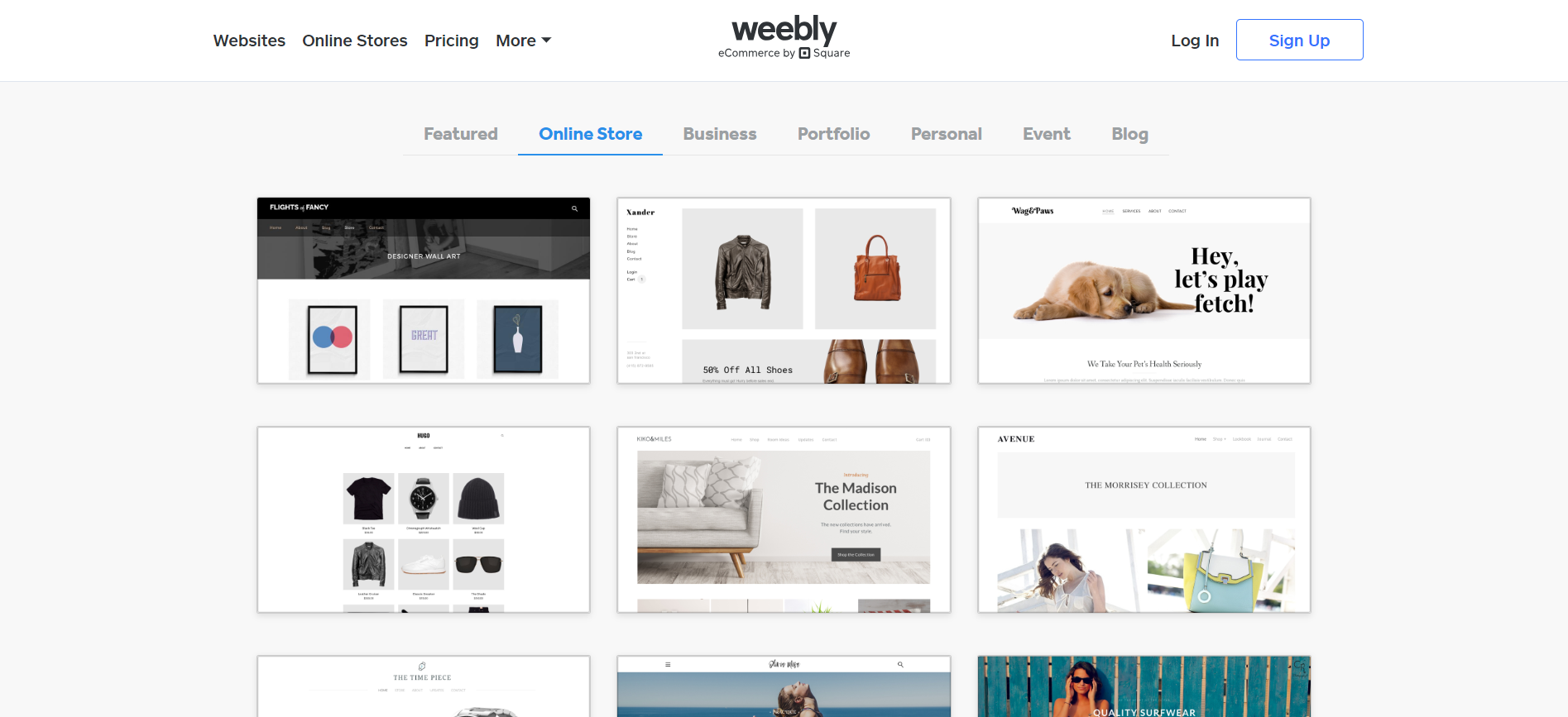

On the other hand, Adobe Commerce, formerly Magento, prioritizes flexibility over pre-built templates. While it offers a limited selection of base themes, users can access third-party themes for customization. Theme options are highly adaptable, allowing changes to layouts, colors, fonts, and the creation of custom page layouts. The platform provides a powerful theme framework for comprehensive control, including frontend editing for basic adjustments. Experienced developers can employ custom code (HTML, CSS, Javascript) for unique designs and advanced functionalities.
Adobe Commerce(ex Magento) Themes
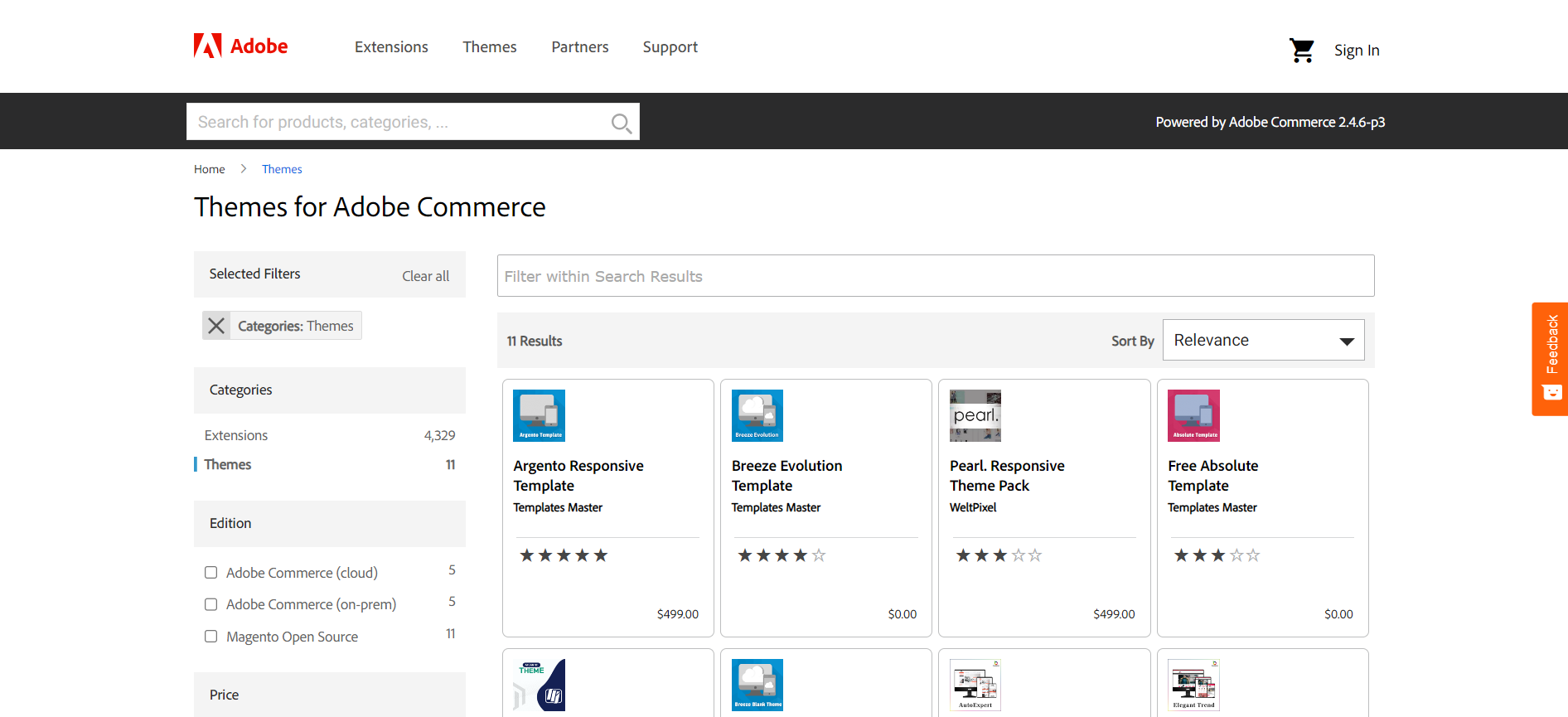
Get a head start on website creation with AI
Create a custom website tailored to your business needs 10X faster with 10Web AI Website Builder!
Ease of use
Ease of useReflects the platform’s overall user-friendliness.Score
Components:
- Learning curve (40%): Quickness and ease of getting started.
- Interface design (30%): Simplicity and intuitiveness of layout.
- User guidance (20%): Quality of tutorials and support.
- Flexibility (10%): Adaptability to various user skills.
 8.1
8.1
 5.4
5.4
🏆 Winner: Weebly
. Scoring 8.1, Weebly is more user-friendly with its drag-and-drop interface, making it accessible for both beginners and experienced users. Adobe Commerce(ex Magento), with a score of 5.4, offers a robust platform but with a steeper learning curve, especially for those new to ecommerce. If ease of use is a priority, Weebly is the clear winner in this category.
Learning Resources
🏆 Winner: Adobe Commerce(ex Magento)
. While both platforms offer solid learning resources, Adobe Commerce(ex Magento) goes a step further with its wide array of detailed tutorials and active community forums, making it easier for users to learn and adapt.
For ecommerce
EcommerceMeasures the platform’s effectiveness in supporting online business activities.Score Components:
- Ecommerce themes and templates (20%): Variety and design of templates.
- Product management (25%): Ease of managing and organizing products.
- Payment options (25%): Variety and convenience of payment methods.
- Ecommerce features (20%): Features for managing an ecommerce store.
- Integration (10%): Compatibility with external e-commerce tools and services.
 7.1
7.1
 9.4
9.4
When it comes to ecommerce, Adobe Commerce (ex Magento) outperforms Weebly with a score of 9.4 against 7.1. Adobe Commerce is an enterprise-level ecommerce platform offering comprehensive tools for product and inventory management, efficient order processing, customer account management, targeted marketing capabilities, diverse payment processing options, robust security measures, and scalability to accommodate business growth. On the other hand, Weebly offers a user-friendly ecommerce solution with features like unlimited product listings, secure checkout, customizable shipping options, and discount promotions. However, it has limitations such as less design flexibility in templates, certain advanced features being available only with paid plans, transaction fees on the free plan, and the absence of built-in marketing tools, which may require integration with third-party solutions.

|

|
|
|---|---|---|
|
Ecommerce themes and templates |
6.5 |
7.5 |
|
Product page customization |
6.8 |
9.0 |
|
Payment processing and commissions |
7.0 |
7.8 |
|
POS capabilities |
6.0 |
7.0 |
|
Payment gateways |
7.5 |
8.5 |
|
Product numbers |
7.0 |
7.5 |
|
Additional ecommerce features |
6.7 |
8.0 |
Weebly ecommerce features:
- Unlimited products
- Inventory management
- Product reviews and ratings (Paid plans)
- Secure checkout
- Shipping options
- Abandoned cart recovery (Paid plans)
- Basic analytics
- SEO tools
- Marketing integrations (Paid plans)
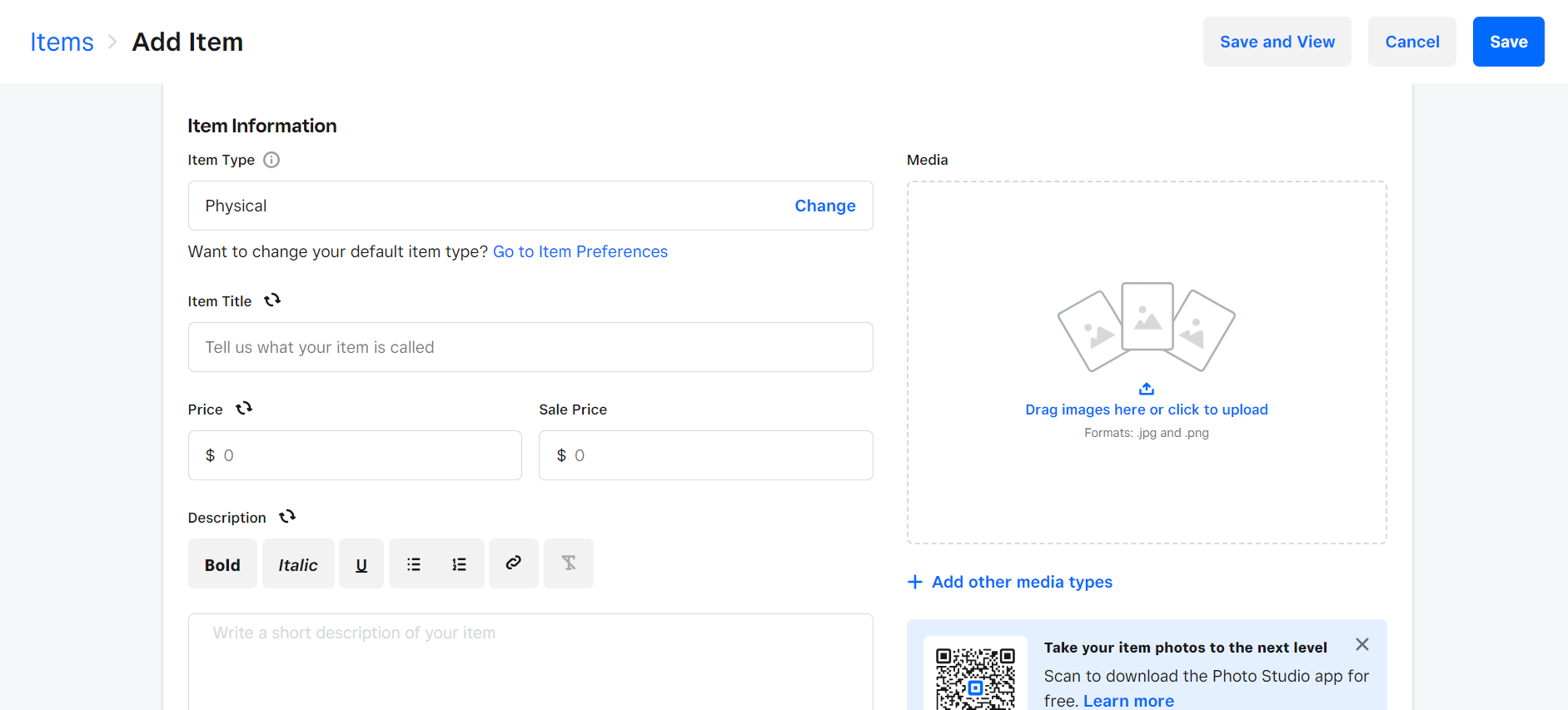
Adobe Commerce(ex Magento) ecommerce features:
- Product and Inventory Management
- Order Management
- Customer Management
- Marketing and Promotions
- Payment Processing
- Multi-Channel Commerce
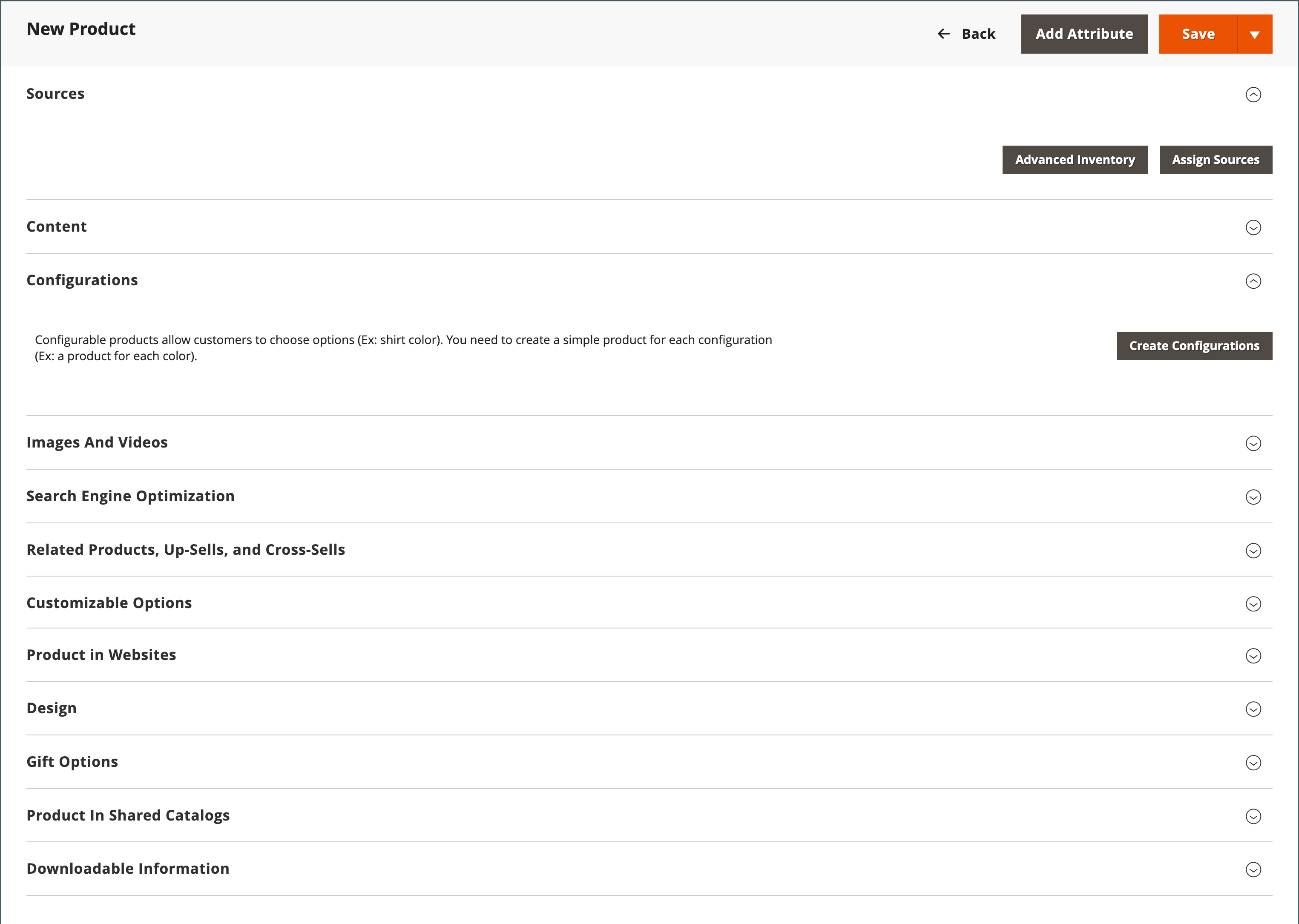
Ecommerce themes & templates
Weebly provides ecommerce-specific themes with a decent range of styles, offering built-in features like product galleries and optimized checkout flows. However, it has limitations compared to dedicated platforms, with a smaller theme selection and less design flexibility, potentially requiring additional costs for premium themes with advanced features. In contrast, Adobe Commerce offers a comprehensive ecosystem for ecommerce themes and templates, enabling businesses to customize their online stores to meet specific branding and functionality requirements.
Product page customization
Weebly allows a decent level of product page customization through its user-friendly interface, offering options for layout, colors, fonts, backgrounds, and content. Advanced customization, including custom CSS and app integrations, is available with paid plans, but limitations exist in design flexibility compared to dedicated platforms. Adobe Commerce, on the other hand, offers extensive customization options for product pages, enabling businesses to enhance the user experience and tailor product displays to their specific needs.
Payment processing
Weebly seamlessly integrates with popular payment processors such as Square, Stripe, PayPal, and others, enabling secure and convenient online transactions for your store. Adobe Commerce offers integrated payment solutions and commission management for seamless online transactions, alongside POS integration for omnichannel retail experiences. It supports a wide array of payment gateways, ensuring flexible and secure payment options for customers. These features make Adobe Commerce a versatile platform for businesses aiming to provide a comprehensive and secure shopping experience both online and in physical stores.
Website Editors
Website EditorsEvaluates the platforms’ website building and editing capabilities.Score Components:
- Customization tools (40%): Range and power of editing features.
- Editor usability (30%): User experience within the editor.
- Design flexibility (20%): Freedom in layout and design changes.
- Update and maintenance ease (10%): Simplicity of updating and maintaining the site.
 7.6
7.6
 7.8
7.8
🏆
Winner: Adobe Commerce(ex Magento)
. Adobe Commerce, with a score of 7.8, offers a user-friendly website editor with its Page Builder tool, designed for ease of use through drag-and-drop capabilities, allowing for simple management and customization of eCommerce sites without extensive developer involvement. It provides a flexible and intuitive platform for users to effortlessly design, update, and maintain their online stores, supported by a variety of design options and themes for tailored branding and promotional activities.
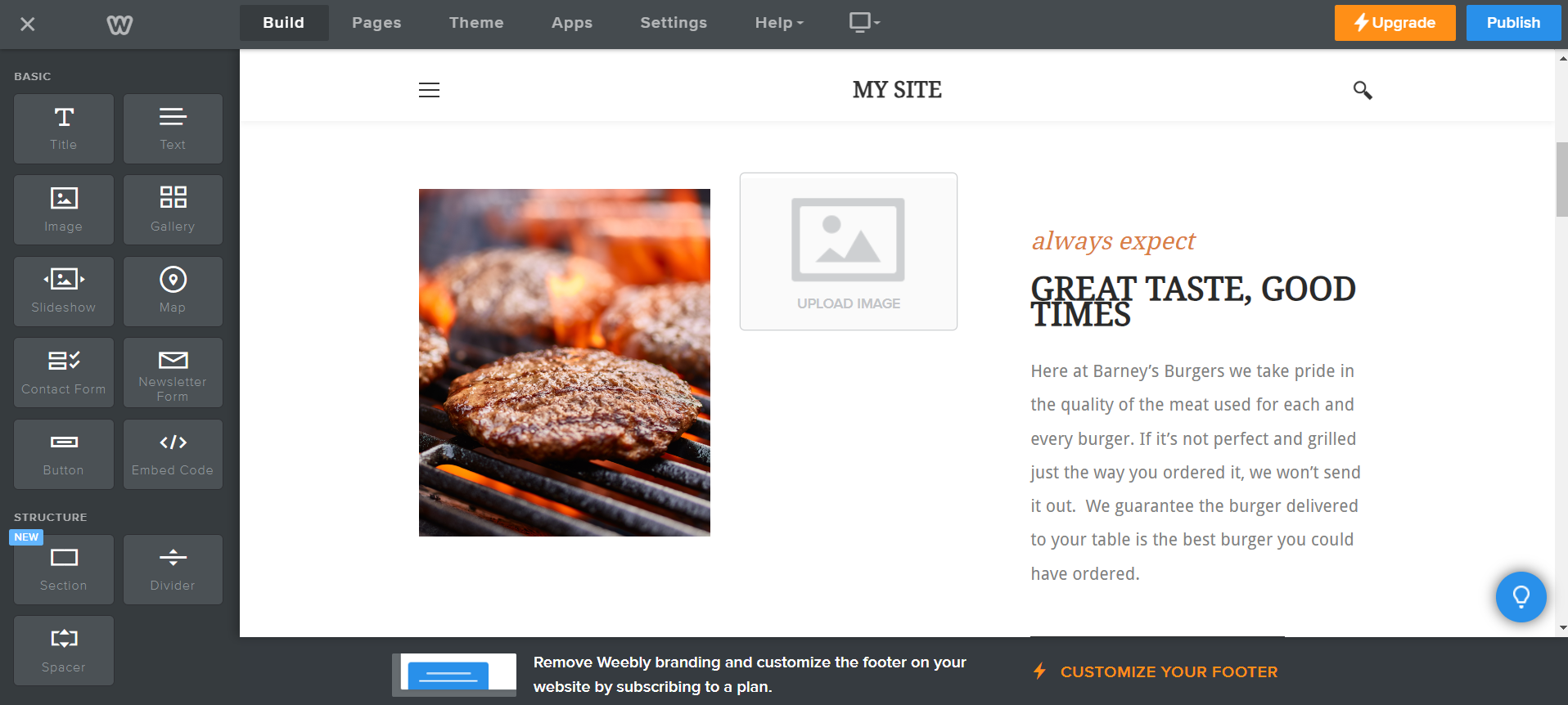
Weebly’s editor, scoring 7.6, stands out for its drag-and-drop simplicity, catering to beginners with an intuitive interface and visual editing. The editor features a range of pre-designed templates, customization options, and content management tools, making it accessible for users without coding knowledge. While offering ease of use, it has some limitations in design flexibility and advanced features, with certain functionalities requiring a move to paid plans.
Mobile editor/app
 8.1
8.1
 0
0
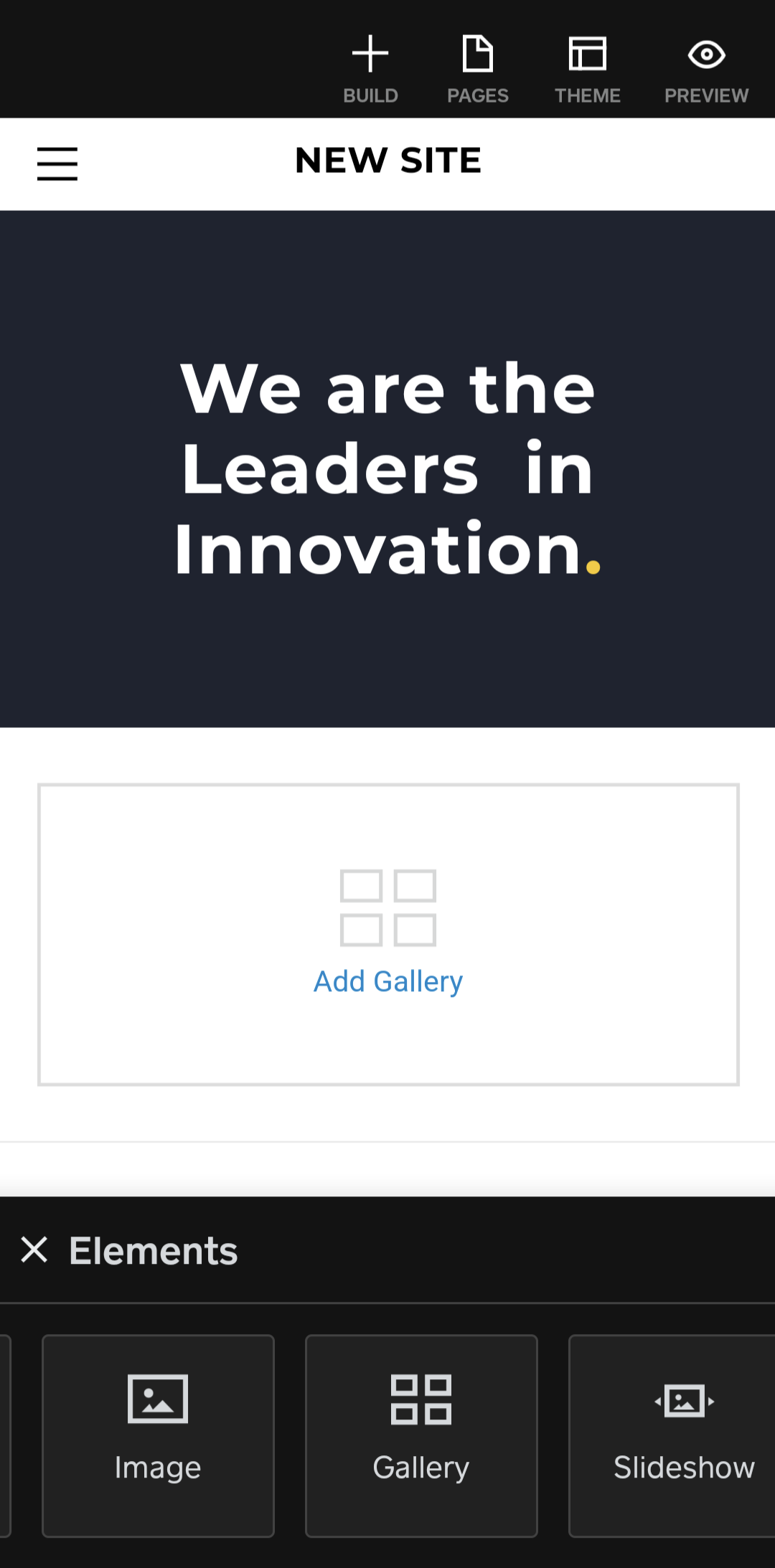
🏆
Winner: Weebly
. Both Weebly and Adobe Commerce (ex Magento) offer different experiences when it comes to mobile editing. Weebly provides a mobile app that allows users to manage and make basic edits to their websites on the go. While it offers features like content management and basic design customization, it has limitations, such as no advanced editing capabilities or extensive design flexibility, making it best suited for quick content updates rather than major design changes.
On the other hand, Adobe Commerce (ex Magento) does not offer a dedicated mobile app for website editing at this time. This lack of mobile editing capabilities puts Adobe Commerce at a disadvantage compared to Weebly, which offers a mobile app for on-the-go website management and editing. Therefore, Weebly is the clear winner in this category.
Product testing options
Product Testing OptionsAssesses the options for trying out platform features before commitment.Score Components:
- Trial quality (40%): Extent and usefulness of the trial or free version.
- Feature accessibility (30%): How many features are available to test.
- Trial duration (20%): Length of the trial period.
- Ease of transition (10%): Smoothness of moving from trial to paid plans.
 8.3
8.3
 3.9
3.9
Overall Result
:
Weebly Wins
. Weebly scores 8.3, significantly higher than Adobe Commerce(ex Magento) which scores 3.9. Weebly offers a free version and a 30-day money-back guarantee for all paid plans, allowing users to explore all features and make a decision within the refund window. Adobe Commerce(ex Magento), on the other hand, does not offer a free or trial version, and does not have a money-back guarantee. However, it does allow users to request a demo version to test premium features.

|

|
|
|---|---|---|
|
Free Plan |
Yes |
No |
|
Trial Duration |
No (30-day money-back guarantee) |
No |
|
Testing Premium Features |
Yes |
Yes (By requesting a demo version) |
|
Money Back Guarantee |
30 days |
No |
Price
PriceLooks at the cost-effectiveness and value for money of each platform.Score Components:
- Plan value (40%): What each pricing tier offers.
- Transparency and clarity (30%): Clearness of pricing structures.
- Flexibility of plans (20%): Range of options to suit different budgets.
- Hidden costs (10%): Additional expenses not included in the plan.
 8.4
8.4
 5.8
5.8
Weebly offers a range of affordable plans, including a free option, and discounts for annual subscriptions, making it a more cost-effective choice for small businesses and individuals. Adobe Commerce(ex Magento), on the other hand, is a premium solution aimed at larger businesses and enterprises, with prices starting from approximately $2,000.

|

|
|
|---|---|---|
|
Free |
Free ($0/month): Basic template selection, 500MB storage, Weebly ads, limited features. |
No offering at this amount. |
|
$0-$10 |
Personal ($6/month): Custom domain, unlimited storage, ad-free, limited SEO and email marketing tools. Value for price: 6.5 |
No offering at this amount. |
|
$10-$20 |
Professional ($12/month): Advanced design options, blog membership features, advanced SEO tools, form analytics. Value for price: 7.5 |
No offering at this amount. |
|
$20-$30 |
Performance ($26/month): Advanced ecommerce features, lead capture tools, custom code injection, marketing automation. Value for price: 8.5 |
No offering at this amount. |
|
$2000+ |
No offering at this amount. |
Adobe Commerce Pro and Managed Services ($2000/month): Adobe Commerce Pro and Managed Services are designed to deliver scalable, secure, and extensive eCommerce solutions tailored to a wide range of business demands. It offers a comprehensive set of ecommerce tools, including product and inventory management, efficient order processing, customer account management, targeted marketing capabilities, diverse payment processing options, robust security measures, and scalability to accommodate business growth. It also offers both self-hosted and cloud-hosted options, providing flexibility and optimized performance. While it does not have an AI website builder, it offers a powerful theme framework for comprehensive control, including frontend editing for basic adjustments. Experienced developers can employ custom code for unique designs and advanced functionalities. |
location. As a result in rare cases the prices displayed here can differ from the ones you see on their
websites.
Hosting quality
Hosting
qualityExamines the reliability and performance of the hosting solutions.Score Components:
- Uptime (40%): Consistency and reliability of website availability.
- Speed (30%): Loading times and performance.
- Bandwidth and storage (20%): Sufficiency of resources provided.
- Data centers (10%): Quality and distribution of hosting infrastructure.
 7.7
7.7
 8.1
8.1
Winner: Adobe Commerce(ex Magento)
Adobe Commerce offers robust and scalable eCommerce solutions with both self-hosted and cloud-hosted options, providing flexibility and optimized performance. Weebly, on the other hand, offers unlimited storage and bandwidth on its paid plans but has been critiqued for slow page loading times and lack of automated backup services.

|

|
|
|---|---|---|
|
Do they offer hosting? |
Yes, included in all paid plans |
Yes, Adobe Commerce offers robust and scalable eCommerce solutions with both self-hosted and cloud-hosted options |
|
Data Centers: |
Weebly leverages a global network of data centers to deliver reliable and efficient website hosting. However, they do not publicly disclose, the specific locations of their data centers due to security and technical reasons. |
Adobe Commerce on Cloud infrastructure Leverages Amazon Web Services (AWS), Specific data center details not publicly available |
|
Type of hosting: |
Shared Hosting, Cloud Based Hosting, Managed Hosting |
Self Hosting, Managed Hosting |
|
Uptime: |
99.9% |
Uptime Guarantee for Adobe Managed hosting is provided |
|
Uptime Guarantee: |
Yes, 99.95% |
Uptime Guarantee for Adobe Managed hosting is provided |
Website Speed Optimization
Website Speed OptimizationEvaluates optimization of website loading timesScore Components:
- PageSpeed Score (30%): Google’s score indicating performance optimization.
- Loading Time (30%): The average time until a website is fully interactive.
- Mobile Optimization (15%): Optimization effectiveness for mobile devices.
- Resource Optimization (15%): Optimizing images, scripts, and other heavy resources.
- CDN Usage (10%): Use of CDN to enhance speed across geolocations.
 7.9
7.9
 6.6
6.6
🏆 Winner: Weebly
Both Weebly and Adobe Commerce(ex Magento) prioritize website performance and page speed, with Weebly focusing on load balancing and CDN, and Adobe Commerce(ex Magento) emphasizing CDN, database optimization, caching, and indexing. However, Weebly gets the edge when it comes to website speed optimization.

|

|
|
|---|---|---|
|
Focus |
Load balancing, CDN |
CDN, Database optimization, Caching, Indexing |
|
Performance Tools |
Google Lighthouse, PageSpeed Insights |
Google PageSpeed Insights Integration |
|
Key Strategies |
Load balancing, CDN |
CDN, Database optimization, Caching, Indexing |
|
Load Times |
2s to 4s |
Varies widely, dependent on optimization |
|
Page Speed Scores Range |
Average 80+/100 |
Scores vary; influenced by plugins, images |
|
Core Web Vitals Improvement |
Significant enhancements |
Emphasis on LCP, FID, CLS improvements |
Weebly has significantly enhanced its Core Web Vitals performance by implementing measures such as automatic image optimization, lazy loading for content, code minification, and caching. These improvements, along with streamlined JavaScript usage and an enhanced server infrastructure, aim to boost website loading speed and responsiveness. The load times for Weebly range from 2s to 4s, with an average PageSpeed score of 80+/100.
Adobe Commerce(ex Magento), on the other hand, places emphasis on LCP, FID, CLS improvements for Core Web Vitals. Its strategies for speed optimization include CDN, database optimization, caching, and indexing. However, the load times and PageSpeed scores vary widely, dependent on optimization and influenced by plugins and images.
Get a head start on website creation with AI
Create a custom website tailored to your business needs 10X faster with 10Web AI Website Builder!
Plugins and integrations
Plugins and integrationsMeasures the range and effectiveness of additional plugins and integrations.Score Components:
- Variety of options (40%): Range of available add-ons.
- Integration smoothness (30%): Ease of integrating plugins into the site.
- Quality of plugins (20%): Functionality and reliability of the options.
- Custom integration capabilities (10%): Support for custom or third-party integrations.
 7.5
7.5
 9.1
9.1
🏆 Winner: Adobe Commerce(ex Magento).
Adobe Commerce(ex Magento) scores a high 9.1, offering a vast array of extensions and plugins, estimated to be in the tens of thousands, covering aspects such as marketing, payment processing, shipping, content management, security, and optimization. Weebly, with a score of 7.5, also offers a variety of plugins and integrations, but Adobe Commerce(ex Magento)’s extensive offerings and flexibility give it the edge.
It’s worth noting that Adobe Commerce(ex Magento)’s plugins can be more expensive, with some costing up to $5,000 upfront or $500 per month. However, the platform also offers free options and lower-cost subscriptions, providing a range of choices to suit different budgets and needs.
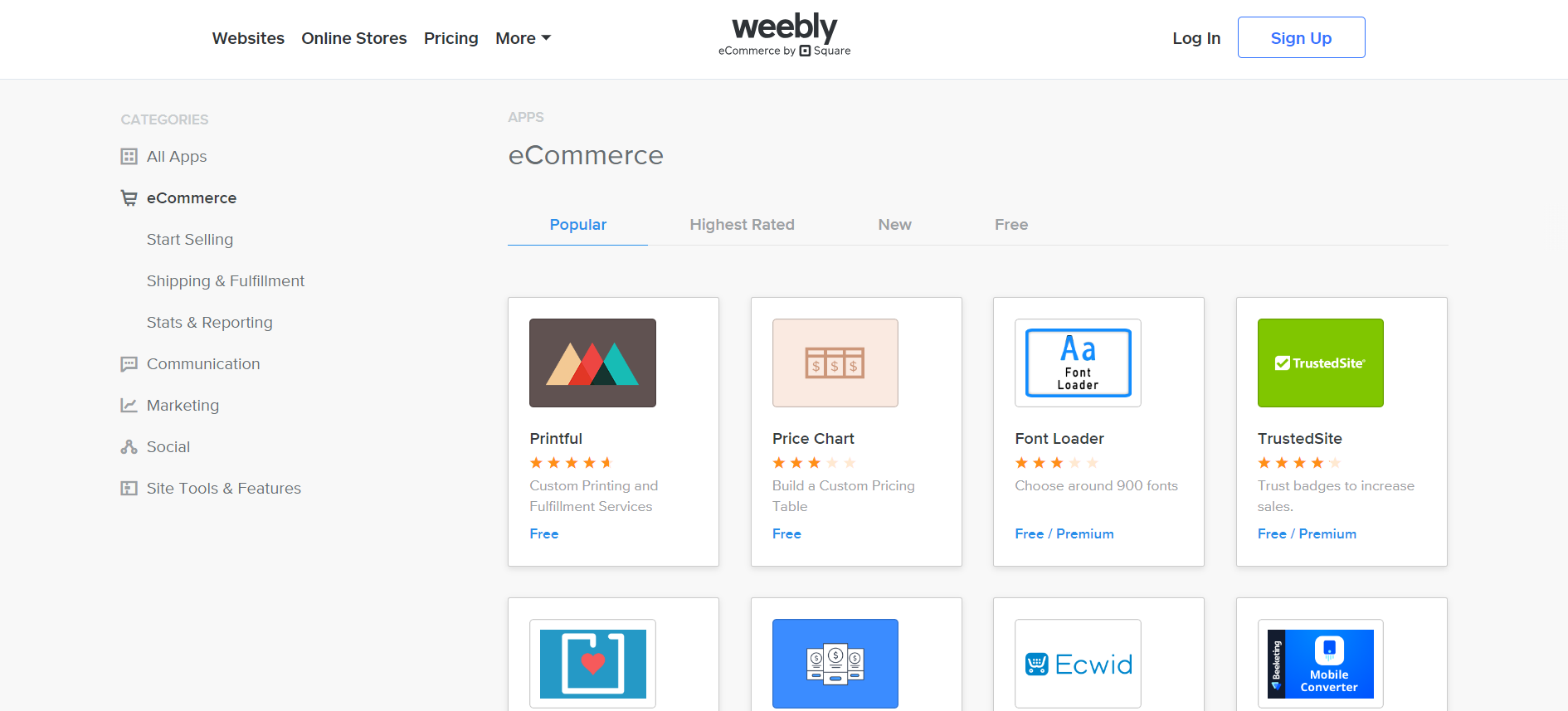
Adobe Commerce(ex Magento) Applications
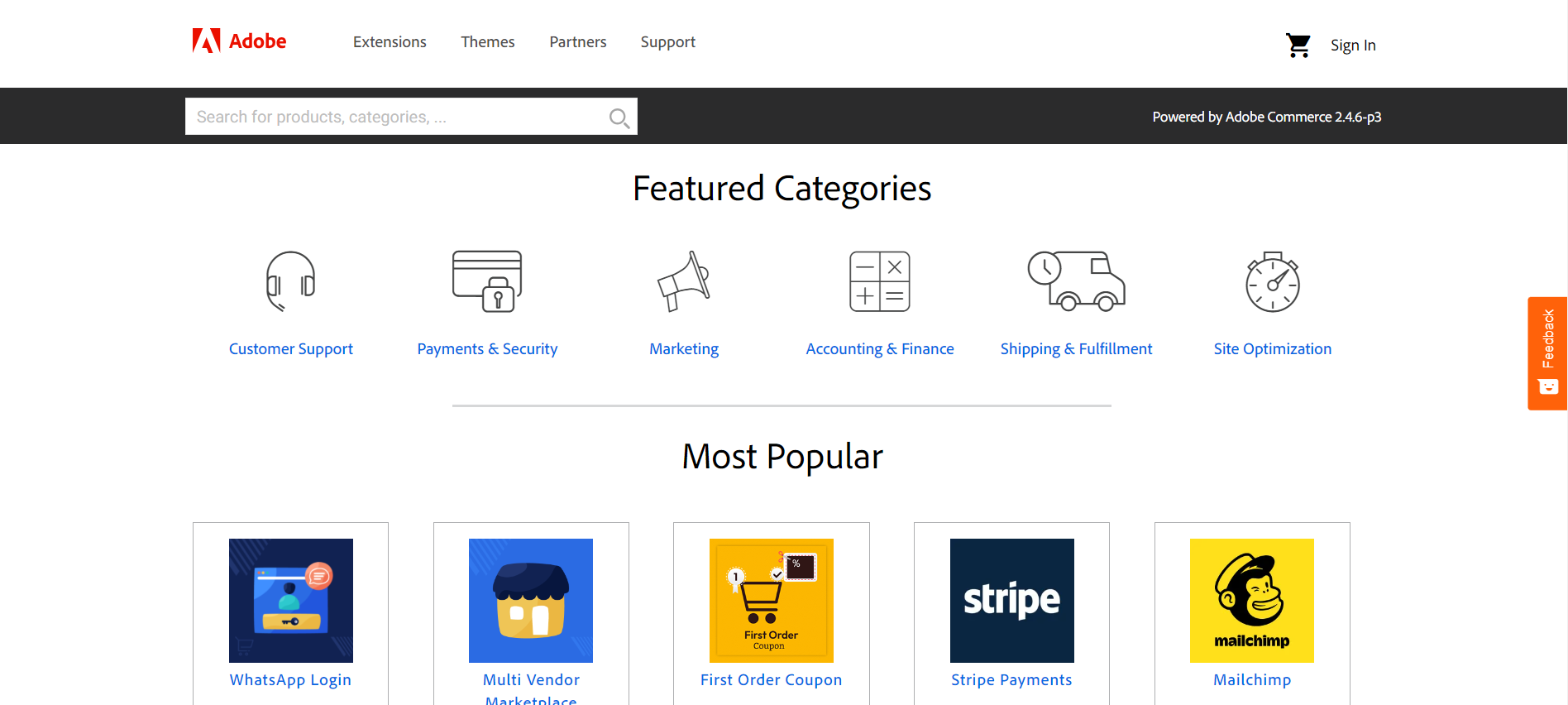
Marketing Features
Marketing featuresAssesses tools and options available for marketing.Score Components:
- SEO tools (40%): Effectiveness of SEO features.
- Marketing automation (30%): Availability and quality of marketing tools.
- Social Media integration (20%): Ease and depth of social media connectivity.
- Email marketing (10%): Quality and usability of email marketing tools.
 7.1
7.1
 8.1
8.1
🏆
Overall Winner: Adobe Commerce(ex Magento)
. Adobe Commerce (ex Magento) stands out for its advanced marketing tools, especially in analytics and ad campaign management. Weebly is strong in email marketing and blogging, ideal for content-driven strategies.

|

|
|
|---|---|---|
|
SEO Tools |
|
|
|
Email Marketing |
|
|
|
Blogging |
|
|
|
Social Media Integration |
Easy link to social media accounts and share buttons |
Advanced integration for selling directly on social platforms |
|
Analytics and Reporting |
Built-in analytics for tracking site performance |
Detailed analytics for in-depth insights |
|
Ads and Promotions |
Integrated marketing tools for creating and managing ads |
Advanced marketing tools for creating and managing promotions, coupons, and personalized content |
Customer Support
Customer supportEvaluates the quality and availability of support options.Score Components:
- Response time (40%): Speed of support responses.
- Support quality (30%): Effectiveness and helpfulness of the support.
- Availability (20%): Range of support channels (phone, chat, email).
- Resource richness (10%): Quality of self-help and educational materials.
 7.3
7.3
 8.3
8.3
🏆 Winner: Adobe Commerce(ex Magento)
. Adobe Commerce(ex Magento) takes the lead in this category with a customer support score of 8.3. They offer 24/7 customer support through various channels such as phone, email, and live chat. Additionally, they provide a comprehensive knowledge base and community forums for self-help and troubleshooting. For enterprises, they offer dedicated account management and access to a global network of experts.
Weebly, with a customer support score of 7.3, also offers a variety of support options, including an extensive Online Help Center with articles and tutorials, a Community Forum for peer-to-peer assistance, and Email Support for submitting tickets. Live Chat is available during limited hours, and Phone Support is offered to Pro and Business plan users in the US and Canada during specific hours. For smaller businesses with enterprise-like requirements, Weebly offers a dedicated account manager, priority phone support, and enhanced onboarding and training resources.
Security
SecurityLooks at the platforms’ security measures and data protection.Score Components:
- Data protection (40%): Safeguards for user and customer data.
- SSL and encryption (30%): Implementation of secure connections.
- Compliance (20%): Adherence to industry security standards.
- Regular updates (10%): Frequency of security updates and patches.
 8.3
8.3
 8.4
8.4
🏆
Winner: Adobe Commerce(ex Magento)
. Adobe Commerce(ex Magento) takes a slight edge over Weebly with a security score of 8.4 compared to Weebly’s 8.3. Adobe Commerce(ex Magento) provides secure private data storage and protection through advanced encryption and access control measures. It also offers regular security updates and patches to address any vulnerabilities, secure payment processing, and tools for monitoring and detecting any suspicious activity on the website.
Although it may not offer the same level of specialized ecommerce security features as Adobe Commerce(ex Magento), Weebly is committed to maintaining a secure platform for all types of websites. This includes secure data centers, routine system updates, encryption through SSL certificates, compliance with PCI standards, automatic malware scans, spam prevention measures, robust password protection, optional two-factor authentication, and user permission controls. These measures collectively ensure a secure and reliable environment for individuals and businesses utilizing Weebly for website creation.
AI Capabilities
AI capabilitiesMeasures the effectiveness of AI-driven features and tools.Score Components:
- Automation efficiency (40%): Impact of AI on streamlining processes.
- Personalization (30%): AI-driven customization for users or customers.
- AI-Assisted design (20%): Role of AI in website design and functionality.
- Data analysis (10%): Use of AI in interpreting user data and analytics.
 1.8
1.8
 7.7
7.7

|

|
|
|---|---|---|
|
Personalized Design |
|
|
|
SEO Optimization |
Third-party tools available for SEO optimization |
AI-driven SEO optimization for content and product descriptions |
|
Customer Behavior Analysis |
|
AI analyzes shopper behavior and trends for personalized product suggestions |
|
Sales Predictions |
|
AI forecasts inventory needs and optimizes pricing strategies |
|
Inventory Management |
|
AI-driven inventory management |
|
Content Generation |
Third-party tools available for content generation |
AI automates the generation of unique and compelling product descriptions |
🏆 Winner: Adobe Commerce(ex Magento)
. Adobe Commerce, with a score of 7.7, integrates AI across various aspects of eCommerce, enhancing customer service, security, and marketing. It also uses AI for content creation and optimization, inventory management, and price optimization.
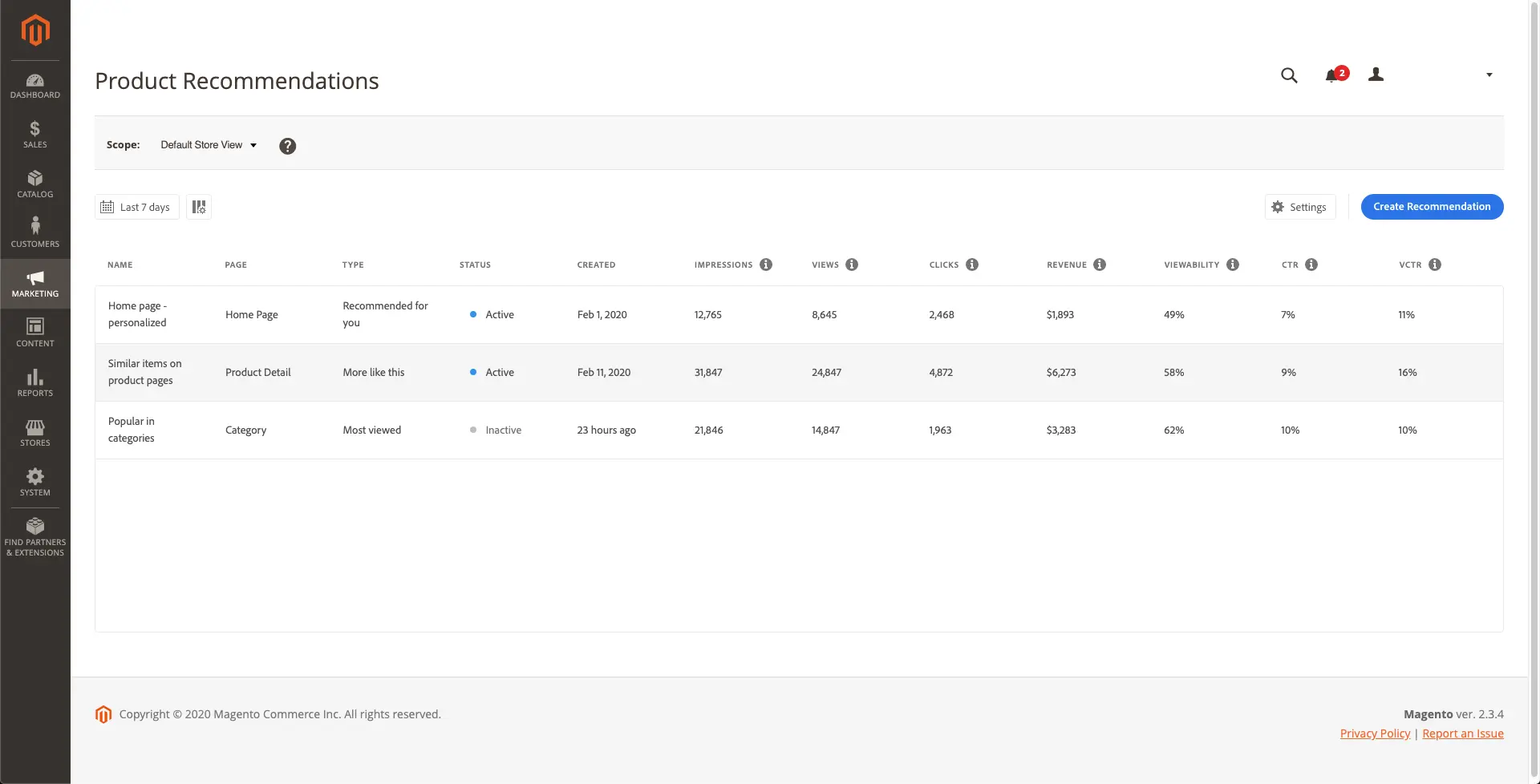
Weebly, with a score of 1.8, does not have any native AI capabilities, but it does allow for the integration of third-party AI tools. However, these capabilities are not as comprehensive or integrated as those offered by Adobe Commerce.
User Management
User ManagementAssesses the platforms’ capabilities in managing user roles, permissions, and accessibility.Score Components:
- Role Customization (40%): Flexibility in creating and defining user roles and
permissions. - Ease of Management (30%): User interface and tools for managing users.
- Access Control (20%): Effectiveness of access control measures for different user
levels. - Scalability (10%): Ability to manage a growing number of users efficiently.
 6.5
6.5
 8.0
8.0
🏆 Winner: Adobe Commerce(ex Magento)
. Both Weebly and Adobe Commerce(ex Magento) offer different user management capabilities.
- Weebly’s number of users permitted to edit a website varies depending on the plan selected. The Free Plan allows only one user, suitable for personal or simple projects, while the Personal Plan accommodates two users, making it appropriate for small businesses or collaborative efforts. The Professional Plan permits up to 10 users, catering to growing businesses or teams with specific roles, and the Business Plan offers unlimited user access.
- Adobe Commerce(ex Magento) allows the number of users who can edit a website based on user licenses and roles. User licenses, bought separately, determine the total number of users allowed, with additional licenses purchasable as needed. Roles and permissions, managed within the available licenses, control access and modifications, ensuring data security and efficient workflow.
Weebly User Roles and Access Levels:
| Role | Description | Access Highlights |
|---|---|---|
| Owner | The primary account holder and creator of the Weebly site. | Full access to all site features, including design, pages, settings, store management, and analytics. |
| Admin | Users granted significant control over the site by the Owner. | Can edit and publish site content, manage store orders, view analytics, and access most site settings, except for site ownership transfer and account deletion. |
| Author | Users with limited permissions, typically focused on content creation. | Can create and edit blog posts, manage comments, and sometimes edit specific pages if granted permission. |
| Store Manager | Specifically focused on e-commerce aspects of the site. | Access to manage and fulfill orders, view store analytics, and edit product details, but cannot change site design or settings. |
Adobe Commerce(ex Magento) User Roles and Access Levels:
| Role | Description | Access Highlights |
|---|---|---|
| Administrator | Has full permissions to all aspects of Adobe Commerce, including global settings and data. | Full access to all settings, data, and functionalities within Adobe Commerce. Can manage other users’ roles and permissions. |
| Store Administrator | Responsible for the day-to-day management of the store, including products, orders, and customer service. | Access to manage products, process orders, and handle customer inquiries, but may have restricted access to sensitive global settings or data. |
| Design Team Member | Focuses on the aesthetic and user experience aspects of the store, working on content design and layout. | Access to content design tools and functionalities, but restricted from accessing customer, order information, and other sensitive areas. |
| Default User (B2B) | Has view-only access to company profile and credit information, and full access to activities related to sales and quotes. | Full access to sales and quotes activities; view-only for company profile and credit information. |
| Senior Buyer (B2B) | Engaged in purchasing, with access to all Sales and Quotes resources, and view-only permissions to the Company Profile, User and Teams, Payment Information, and Company Credit. | Comprehensive access to Sales and Quotes, with limited viewing rights for company’s financial and profile data. |
| Assistant Buyer (B2B) | Assists in purchasing activities, with permissions to place orders using Checkout with Quote, and to view orders, quotes, and company profile information. | Permission to execute orders and access relevant purchasing data; view-only access to company profile information. |
Additional Features

|

|
|
|---|---|---|
|
SSL Certificate |
|
|
|
Custom Domain |
|
|
|
Free Custom Domain Included |
|
|
|
International Domains |
|
|
|
Mobile Responsive |
|
|
|
Page Speed |
|
|
|
Website Builder Mobile App |
|
|
|
Convert a Website To An App |
|
|
|
Website Analytics |
|
|
|
Multilingual Sites |
|
|
|
Multiple Users |
|
|
User Feedback
Square Online (formerly Weebly) receives positive reviews for its user-friendly drag-and-drop interface and quick website development features, making it suitable for small businesses. Users highlight its role in efficient appointment booking, saving time in coordination and scheduling. However, some express a desire for more advanced building tools and better pricing. The platform is recognized for streamlining website and payment operations, though opinions on customer service and design limitations are mixed. Overall, it is considered a good, affordable solution for small businesses.
Adobe Commerce (formerly Magento Commerce) receives high praise for its comprehensive ecommerce solutions, offering features like customer and order management, scalability, and customization options. Users appreciate its flexibility and ease of use, although some mention a learning curve due to its extensive features. Despite occasional drawbacks like slow speed or complexity, Adobe Commerce proves beneficial for businesses seeking robust ecommerce platforms, aiding in sales growth, customer management, and overall efficiency in managing online stores.
The making of this blog
We followed a clear, step-by-step process to write and research this article.
FAQ
Which platform is better for ecommerce, Weebly or Adobe Commerce (ex Magento)?
Can I use both Weebly and Adobe Commerce (ex Magento) for creating an informational business website?
How do Weebly and Adobe Commerce (ex Magento) compare in terms of design functionalities and templates?
Which platform is easier to use for beginners?
How do the website editors of Weebly and Adobe Commerce (ex Magento) compare?
Which platform offers better product testing options?
How do the prices of Weebly and Adobe Commerce (ex Magento) compare?
Which platform offers better hosting quality?
How do Weebly and Adobe Commerce (ex Magento) compare in terms of website speed optimization?
Which platform has better plugins and integrations?
How do the marketing features of Weebly and Adobe Commerce (ex Magento) compare?
Which platform offers better customer support?
How do Weebly and Adobe Commerce (ex Magento) compare in terms of security?
Which platform has better AI capabilities?
How do user management features compare between Weebly and Adobe Commerce (ex Magento)?










